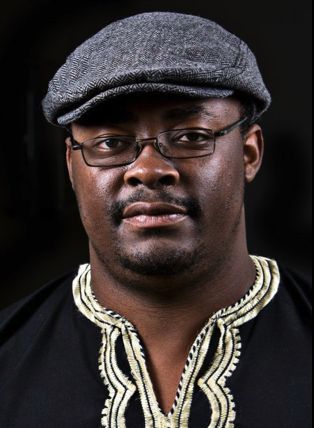Tendai Frank Tagarira: “Even my own mother tells me don’t come back to Zimbabwe.”
by Andy Tybout / July 11, 2011 / No comments

Photo: Tendai Frank Tagarira, from the cover of his book
Savoring the Moment and Monologue of Consciousness.
For Tendai Frank Tagarira, writing isn’t merely a vocation: it’s a means of ensuring his remaining years aren’t wasted.
The prolific Zimbabwean author, who currently resides in Aarhus, Denmark, hardly believed he would live to his current age of 27. After publishing a stinging critique of the Mugabe regime, Trying to Make Sense of It, in 2009, he received death threats, his Namibian apartment was ransacked, and he nearly crashed into pedestrians after his motorcycle brakes were tampered with.
Although he now feels safe in Denmark, where he lives as an International Cities of Refuge Network (ICORN) guest writer, he harbors no delusions about what would happen if he returned to his home country within a few years. “Technically I’m a dead person,” Tagarira said. “Even my own mother tells me don’t come back to Zimbabwe.”
Faced with an uncertain future, Tagarira is making the most of his two-year European residency. Since his arrival last June he’s already authored eight books, including Mugabe Must Go!, a collection of protest poems, and Ubuntu Burning, a novel about xenophobia in South Africa.
Sampsonia Way spoke with Tagarira over Skype about Robert Mugabe, the different means of illustrating a message, and the psychology of discrimination.
In the introduction to Mugabe Must Go! you claim that your call for Mugabe’s resignation is not “personal.” What do you mean by this? Your aversion to the dictator seems in fact quite personal; often, your poems are designed expressly to humiliate him.
[Laughs] That book is very direct criticism. In Europe and Africa writers use a lot of metaphor, but when I wrote this book I imagined that Mugabe was sitting where you are, and I wanted him to know: “Okay, we are facing each other this way, but there’s nothing personal about this, because this is the truth, and the truth is not personal, it’s reality. The reality is you have failed us.” Zimbabwe has a lot of potential, and is an African economy that can still become an economic powerhouse. But Mugabe has failed us. Seriously, at the age of 87, what more can he offer to the children of Zimbabwe?
For some writers, the desire to write come from a sense of urgency; for others as a creative impulse. For you, is it both?
I don’t have a method. I was telling my girlfriend yesterday, “I write from my heart.” So whatever state my heart is in at that moment, that’s my primary drive. I’m not writing from the perspective of, “Okay I have to be creative.”
Much of your work resembles children’s stories or parables. Do you think this is a more effective way to illustrate political messages than stating them upfront?
If you read [the upcoming story] “Bili the Pink Elephant,” it’s kind of funny. It’s about a pink elephant the size of a rabbit. But if you look at the story’s metaphor, you’ll understand that if you are pink and you’re the size of a rabbit, that does not make you any less of an elephant. I’m trying to deal with the human condition in Africa in a story that kids can relate to like Animal Farm [by George Orwell]. I think that book managed to address things that people are still afraid to talk about openly.

Tendai Frank Tagarira reads at the Betty Nansen theater in Fredriksberg, Denmark. Photo: Nausikáa Tanne Persson
What inspired your shift from direct commentary to allegorical commentary?
My writing has been getting me in trouble, so I’ve started thinking that maybe I should write in metaphor. Maybe to get the guy I’m trying to communicate with to listen, I shouldn’t be so direct in criticizing him. Maybe I should write an allegory, and reading that allegory he’ll think: “Hmm…he was really talking about me.” So this is my new motivation. And I guess it’s a product of my surroundings. In Denmark I’ve been realizing that people don’t really like direct criticism, so maybe I have to change my methods. But I still have to tell people a message. I’m not going to write if there’s no message.
You’ve lived in exile three times— in Botswana, Namibia, and Denmark. What are the most trying aspects of living away from home for extended periods of time?
First, the one you just mentioned: Living away from home. But at some point you start asking yourself, where is home, what is home? Sometimes I think home is where the people you love are around you, but you can also love people in your current country. So I still ask, what is home?
Che Guevara answers this question for me very nicely. He wrote that when he was in Guatemala he felt Guatemalan, when he was in Mexico he felt Mexican, when he was in Argentina he felt Argentinean, when he was in Cuba he felt Cuban. I think I can relate to this in some respects.
Of course my home will always be in Africa. But my home as a human is humanity — that’s my home.
If you feel like a native in each country you live, does that also mean you have to deal with those countries’ problems? How do you face that added challenge to being in exile?
Every country I go to, I feel sensitive to people’s suffering. In Botswana, they are also xenophobic — they hated us Zimbabweans. They also have a lot of problems with HIV, and were just killing their own kind. If they keep at the rate they’re going, by 2030 or something the whole population could be extinct.
Somehow I always end up knowing the socio-political and economic issues of every country I’m living in. And for me, I guess the hardest thing is my consciousness being open to all these things and not being able to close it. Whatever’s happening where I live affects me, and I have to respond. And then I get in trouble [laughs].
…
Mugabe Must Go! Tendai Frank Tagarira’s 9th book.
You’ve been harassed in Aarhus before for being African. Now, which are the problems you have to deal with?
Denmark is a very interesting country. It’s a country where the Nazi party is allowed to be an official political party. A couple of days after I arrived, while I was battling criticism from Mugabe’s spokesperson, the Nazis in Denmark were distributing flyers in the town where I live saying, “Send this negro back to Africa.” This came out in the newspapers, and the mayor of the town said, “No, this is not good, he is a guest of the city.”
There are widespread immigrant problems in Denmark. There’s a right-wing party called the DF [Danish People’s Party] that actually wants to ban all non-Western immigrants from coming to Denmark. So if you’re a non-Western immigrant living in Denmark it’s pretty difficult.
Have you had to deal with other experiences like the one you mentioned before?
A couple of months back I was standing at the train station waiting for a friend of mine when a man spat at me. He called me a dog, an animal. He had a kid with him, about seven years old. And this is the ironic part: the guy was actually from the Middle East.
This became a huge deal in the newspapers here because I wrote about it in my column in the national newspaper [Jyllands-Posten]. It became a debate about Muslims thinking they’re better than Africans. I think the Danes liked my story because it was not a Dane who spat at me. Sometimes I wonder: if it had been a Dane who had spat at me, would the newspaper have reacted with the same enthusiasm?
But I feel sorry for the guy and some part of me thinks it was blown out of context. I forgave him a long time ago; I’ve moved on, but it’s a story in this town because there are problems between Muslims and the Danes (I don’t know if the man who spat at me is Muslim, but he’s from the Middle East).
But in that culture, for someone to spit at someone is the worst thing you can do, the lowest degradation. And that gets you thinking: why would a man spit at you? Again, it gives you something to think about.
Are there any benefits of exile?
There’re more positives than negatives because you get to experience things you would never experience in your imagination. You get to meet people and see that the world is huge. Apart from missing my parents, I think it’s a good eye-opener. But I miss my parents and my brothers and sisters. One of the most difficult things is not being able to see my mother, not being able sit under the mulberry tree at her house and just eat mulberries.
On the other hand, I have written several books in Denmark and, most importantly, I have carried on my work as a Human Rights Defender. I have come to love Aarhus and Denmark as my home.
Purchase Tendai Frank Tagarira’s work online.
Read two of Tagarira’s protest poems.
Read Sampsonia Way’s interview with two Zimbabwean writers, Chenjerai Hove and Brian Chikwava.




